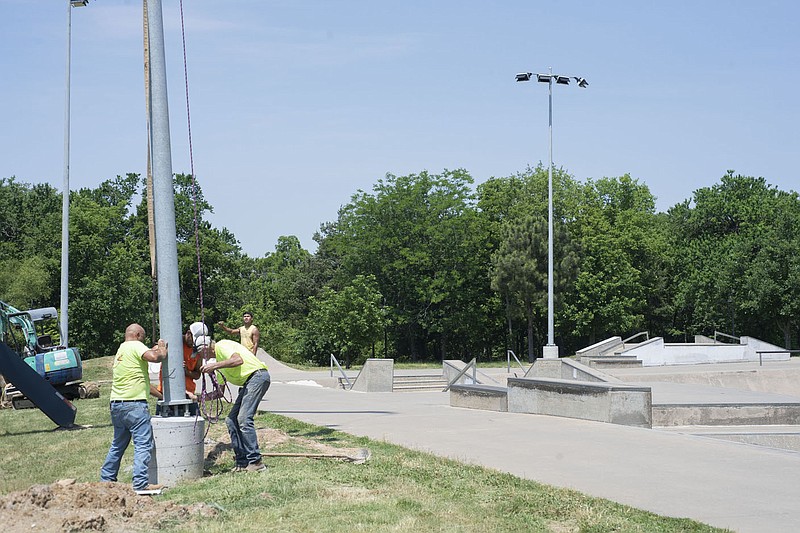FAYETTEVILLE -- The day is finally here, and in time for Go Skateboarding Day, no less.
The city last week installed lights at Grinders Skate Park at the southwest corner of Walker Park. The ceremony, which was scheduled for today at 4 p.m., has been moved to tomorrow June 22 at 4 p.m. due to inclement weather.
Skaters have been asking for lights since the park opened in 2003. The City Council in February approved a contract with Electrical Resources in Centerton to install the lights. Engineering Elements in Fayetteville designed the lighting.
The entire project cost about $96,000, said Ted Jack, park planning superintendent. The lights are attached to six, 40-foot-tall poles with 20 fixtures total. The system is designed to account for the odd angles skaters encounter when riding around the bowls, blocks, rails and ledges of the park. A skater in the air is less likely to come back down into darkness, he said.
"We didn't go stick some barn lights on some wood poles," Jack said. "These are nice concrete foundations and metal poles that'll have a real long service life."
The 4,000-kelvin light-emitting diode bulbs are activated with a button and turn off automatically when Walker Park closes at 11 p.m. The city used park development money to pay for the project.
By comparison, lights at football stadiums are typically 5,000 to 6,000 kelvins. The lights on the city's trails are 3,000 kelvins.
The city's Parks Department fielded requests and petitions for lights at the park for years. Roy Rodezno with the Northwest Arkansas Skateboarding Foundation said the lights will enable more people who perhaps couldn't make it during daytime hours to get into the sport.
In summer, skaters typically want to get out later in the day to avoid blistering heat, Rodezno said. In the colder months, the sun goes down sooner. The lights will add hours of skate time at the park, he said.
The foundation can now look into hosting events that go later in the day. The foundation will host a leg of its Crown Skateboarding Championship from 1-5 p.m. Saturday at Walker Park. Participants and spectators will be able to keep the party going late if they want.
Rodezno said he thinks the lights will help the city's skateboarding scene grow. Skaters who live in town no longer will have to seek venues in other cities to skate later. The lights at the skateboard park at Memorial Park in Bentonville stay on until 11 p.m., for instance.
Youngsters and their parents also can feel safer about skating the park, Rodezno said.
"It'll definitely help with the younger crowd," he said. "Also, the girl skaters will feel more comfortable to come out. That area will see a boost with more skaters other than just guys."
Today's ribbon-cutting ceremony will take place on Go Skateboarding Day, an annual event organized by the International Association of Skateboard Companies. The day is meant to encourage young people to get outside and practice the sport.
More News
A little history
Grinders Skate Park opened in September 2003. The park was designed by Purkis Rose with input from residents. Frank Hirata, a nationally recognized skateboard professional, led several of the meetings.
The city received grants to help build the park: $100,000 from an Arkansas Parks and Tourism Outdoor Recreation Grant; $5,000 from the Tony Hawk Foundation; and $5,623 in community donations raised through lemonade sales, birthday donations and raffles.
The city also provided $350,000.
Source: Fayetteville
